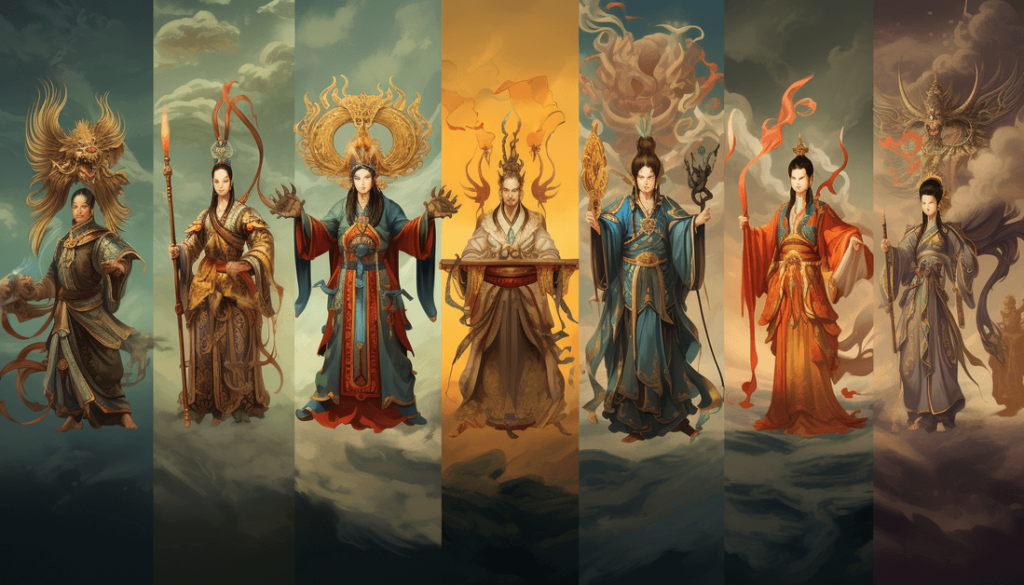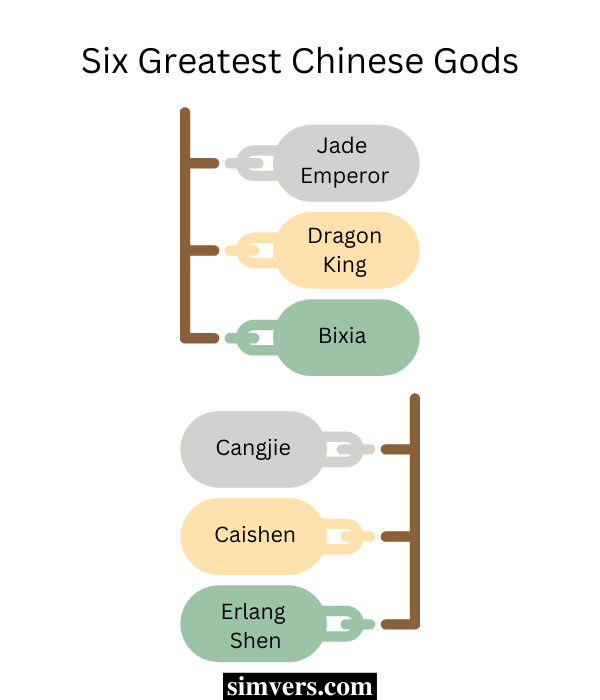
Eager to learn about the Chinese Gods? This comprehensive guide will teach you all about the major and minor deities of Chinese mythology!
With a pantheon of gods and goddesses that numbers in the thousands, China has one of the richest and most complex religious traditions in the world.
While the three main religions of China – Buddhism, Taoism, and Confucianism – have their own unique pantheons, there is also a large body of folk religion that worships a myriad of local and national deities.
When it comes to gods, the Chinese have some of the most unique and varied pantheons in all of human history. From the well-known and popular gods like the Jade Emperor to the lesser-known ones like Lei Gong, the Chinese gods cover a wide range of functions and purposes.
Most Popular Chinese Gods
| 12 Major Chinese Gods |
| Jade Emperor Supreme god in Chinese mythology (also known as Yellow Emperor) |
| Dragon King Ruler of the dragon realm and controls weather |
| Bixia Goddess associated with the sun, fertility, and dawn |
| Cangjie Inventor of Chinese Characters (Patron god of scribes |
| Chang’e Chinese goddess of the moon (Wife of the lunar god |
| Caishen Chinese god of wealth, prosperity, and good fortune |
| Changxi Lunar goddess in Chinese mythology (mother of the twelve moons) |
| Di Jun God of Chinese Literature and the Patron deity of writers and scholars |
| Erlang Shen Chinese god of war and protector of righteousness (powerful warrior wielding a sword and shield) |
| Dianmu Chinese goddess of lightning (portrayed as a young woman with wings) |
| Doumu Goddess of the north celestial pole and the protector of the stars |
| Ji Gong “Mad Monk”, and is often depicted as a eccentric, bald man wearing tattered robes |
Jade Emperor
Jade Emperor is the supreme god in Chinese mythology. His full title is Huangdi, the August Emperor of Jade. He is also known as the Yellow Emperor or the Yellow Thearch, and he is the head of the Three Pure Ones and the Five Emperors.
Characteristics
- Sovereign and supreme ruler of all gods and mortals.
- Associated with the elements of fire and wind.
- Said to live on the Purple Mountain.
- Worshipped as the chief god of the Taoist pantheon.
- Middle-aged man with a long beard and seated on a dragon throne.
- Symbolized by the colors red and green.
Dragon King
The Dragon King is the ruler of the dragon realm and is said to have the power to control the weather. He is often depicted as a large, dragon-like creature with a human head.
Often portrayed riding on a dragon or with a dragon by his side. The Dragon King is said to be the son of the goddess Nuwa and the god Fuxi.
Characteristics
- Guardian of the East.
- One of the Four Heavenly Kings.
- Represents the element of water.
- Associated with the color blue.
- Can transform into a dragon or a human form.
- Worshipped as a fertility god and as a god of agriculture.
- Associated with wisdom, strength, and power.
Bixia
Bixia is a Chinese goddess who is associated with the sun, fertility, and dawn. She is worshipped as the goddess of fertility and is said to be able to grant children to couples who pray to her.
Furthermore, she is also said to be a protector of women and children and is often invoked by mothers to keep their children safe.
Characteristics
- Bixia is the Chinese goddess of the dawn, sunrise, and morning.
- Patroness of newborn infants.
- Referred to as the “Heavenly Nurturer”.
- Depicted as a young woman carrying a large bundle of sunflowers, or as riding atop a dragon.
MORE:
- Best Order To Read The Bible
- Why Does God Hate Me?
- Chinese Gods
- Christians and Alcohol Consumption
- Cremation Biblical Perspective
Cangjie
Cangjie is a Chinese god who is said to have invented the Chinese characters. Moreover, he is also said to be the patron god of scribes and scholars.
He is usually depicted as a man with four eyes. He is sometimes shown with a dragon head, and he is sometimes said to have the head of a ox.
Characteristics
- Cangjie is one of the most important gods in Chinese mythology.
- Inventor of the Chinese characters.
- Associated with the moon and the stars.
- Cangjie is often portrayed as a wise and noble figure.
Chang’e
Chang’e is the Chinese goddess of the moon. She is the wife of the lunar god, Houyi. Chang’e is often portrayed as a woman with a rabbit by her side.
Chang’e has been living on the moon ever since. She is often seen standing on a jade platform, holding a jug of elixir.
Characteristics
- Chinese goddess of the moon.
- Depicted as a beautiful woman with long hair.
- Crescent moon above her head.
- Associated with beauty, femininity, and grace.
Caishen
Caishen is the Chinese god of wealth, prosperity, and good fortune. He is often depicted as a plump, jolly man carrying a string of coins or a treasure sack. Caishen is said to bring good luck and fortune to those who honor him.
Characteristics
- God of wealth and prosperity.
- Depicted as a plump and jovial man.
- Carrying an ingot or a money sack.
- Said to bring good luck.
- Fortune to those who worship him.
- Patron deity of merchants and businessmen.
Changxi
Changxi is a lunar goddess in Chinese mythology who is believed to be the mother of the twelve moons. It is thought that she may have also originated the twelve calendar months of the year. Her husband, Di Jun, is the God of Literature.
Characteristics
- One of Di Jun’s two wives.
- Regarded as Xihe’s western counterpart.
- Bore twelve unique moon daughters.
- Bathed her children in a water pool.
- Demoted to a minor position over time.
- Important early goddess.
Di Jun
Di Jun is the god of Chinese literature and the patron deity of writers and scholars. He is also sometimes referred to as the God of Writing or the God of Calligraphy. Di Jun is often portrayed as a young man with a book in one hand and a brush in the other.
Characteristics
- God of Chinese literature.
- Patron deity of writers and scholars.
- Wise and venerable old man.
- Bestow literary talent and inspiration on those who pray to him.
- Father of 10 sons and 12 moons.
Erlang Shen
Erlang Shen is the Chinese god of war and protector of righteousness. He is often depicted as a powerful warrior wielding a sword and shield. Also, he is known for his wisdom and justice, and is said to be able to see into the hearts of men.
Characteristics
- Chinese god who is often depicted as a three-eyed warrior.
- Patron god of martial artists.
- Expert in both strategy and combat.
- Master of divination and is often consulted for his advice on matters of importance.
- Popular figure in Chinese mythology.
- One of the most powerful gods in the pantheon.
Dianmu
Dianmu is the Chinese goddess of lightning. She is often ,portrayed as a young woman with wings and is said to control the weather. Moreover, Dianmu is also the patron goddess of farmers, and is said to protect them from storms and floods.
Characteristics
- Chinese goddess of lightning.
- Known as the “Mother of Lightning”.
- Depicted as a young woman with wings.
- Associated with the element of fire.
- She is also associated with the colors red and yellow.
Doumu
Doumu is the goddess of the north celestial pole and the protector of the stars. She is also known as the ruler of time and space, and she is the patroness of astronomers and astrologers. Also, she is worshiped by those who wish to have children.
Characteristics
- Known as the “Supreme Pure Heavenly Empress” and the “North Star Goddess”.
- Associated with the Big Dipper constellation.
- Her head is sometimes depicted as the North Star.
- Four dominant arms, holding a scroll and a scepter.
Ji Gong
Ji Gong is a popular Chinese deity. Also, he is also known as the “Mad Monk” and is often depicted as a eccentric, bald man wearing tattered robes and brandishing a large staff.
He is said to have supernatural powers and is revered for his wisdom and compassion. Moreover, Ji Gong is also considered to be a protector of the poor and oppressed.
Characteristics
- Ji Gong is a popular Chinese deity.
- Known for his eccentric and outlandish behavior.
- Depicted as a beggar or madman.
- Associated with wisdom, compassion, and healing.
- Revered by many as a folk hero and protector.
Bottom Line

The Chinese gods are a varied and complex group of beings. There are gods for everything from the weather to love and marriage. Though they may be different from the gods of other cultures, they are equally as important to the Chinese people.
MORE:
- Non-denominational Churches
- Norse Gods and Goddesses
- Old Testament vs New Testament
- Roman Catholic vs. Lutheran
- Roman Gods & Goddesses
